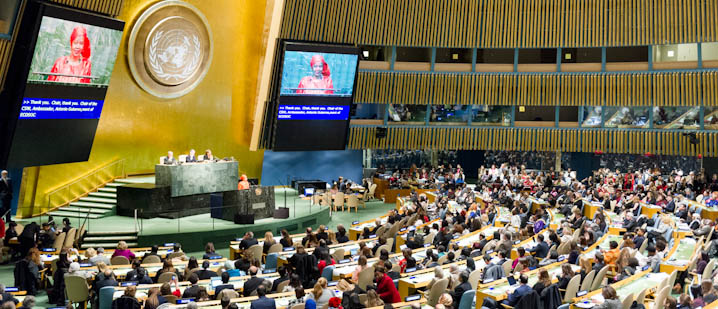ROLE OF NHRIS IN ENHANCING WOMEN’S ECONOMIC PARTICIPATION IN THE CHANGING WORLD OF WORK (SIDE EVENT AT UN CSW61)

ROLE OF NHRIS IN ENHANCING WOMEN’S ECONOMIC PARTICIPATION IN THE CHANGING WORLD OF WORK (SIDE EVENT AT UN CSW61)
The National Human Rights Council (CNDH) participated in a side event on the role of National Human Rights Institutions (NHRIs) in enhancing women’s economic participation in the changing world of work, on Friday March 17th, 2017, at the United Nation headquarter in New York. The side event was held at the 61st Session of the UN Commission on the Status of Women (CSW61), jointly with the Asia Pacific Forum of National Human Rights Institutions and the Global Alliance of National Human Rights Institutions (GANHRI).
The event engaged State Ministers and A-status NHRIs from around the globe in a demonstration of the value-add that NHRIs make to the Commission on the Status of Women (CSW).
“National Human Rights Institutions are uniquely positioned to protect and help fulfill the human rights of women, including their economic participation,” said the organizers. They can “act as a catalyst to empower women claiming and realizing their right equal economic opportunities and to help combat discrimination against women at work”.
Paris Principles compliant (or A-status) NHRIs shared at the event examples of best practices in their work on women’s economic empowerment.
CNDH Board Member Rabéa Naciri highlighted the NHRI’s efforts, action, and advocacy for the full implementation of gender equality and parity in Morocco and its recommendations to harmonize the national legal arsenal with the relevant international standards.
The side event was an opportunity for the CNDH to showcase its role and present its latest recommendations to enhance women’s rights and economic participation in Morocco (mainly its memorandum on domestic workers (mainly girls and women) and its thematic report on discrimination, gender equality and parity).
In its report on gender equality and parity, the Council recommended addressing “constraints such as limited access to financing and other incentives to encourage the creation by women of their own businesses and adopt a women’s empowerment approach in the informal sector, in particular female family caregivers and poor self-employers, and ensure their access to property.”
The CNDH also recommended extending legal protection to women workers and fighting the “glass ceiling” and any discrimination they might face, not to mention the promotion of equal participation at all levels with “sanctions against all stakeholders who do not respect the principle of parity”.
According to the organizers, “the most disadvantaged women and girls in the economic sphere comprise more than half of the 1 billion people who live in extreme poverty”.
The event also highlighted NHRI activities that are making a difference to women’s economic empowerment.
The side event was also an opportunity to share insights on the possibility to strengthen and institutionalize NHRIs’ participation in the United Nations Commission on the Status of Women, in compliance with UN General Assembly Resolution # 70/163 (17 December 2015).






















